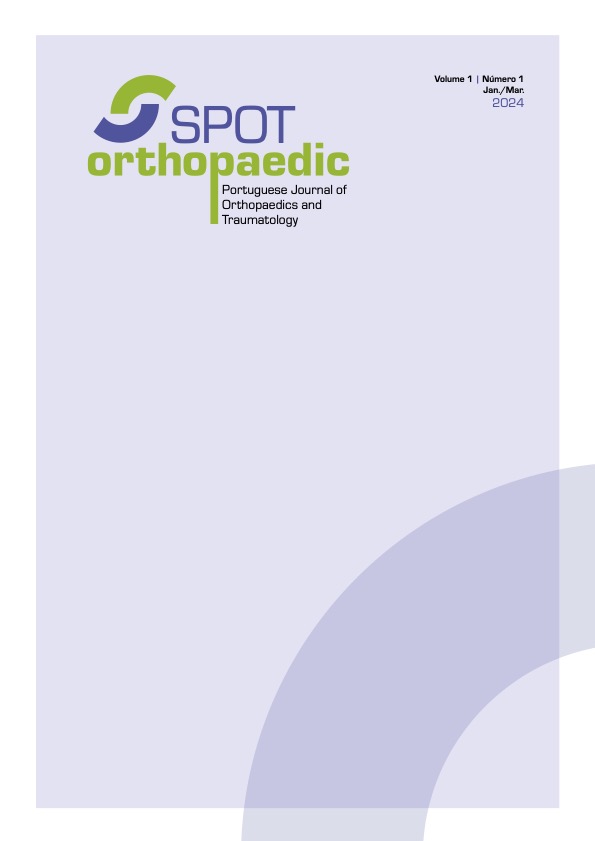Abordagem Deltopeitoralou Antero‐superior na ArtroplastiaTotal Invertida do Ombro:Diferenças no Posicionamentoda Metaglena
DOI:
https://doi.org/10.82189/spot.6Palavras-chave:
Articulção do Ombro, Artroplastia do Ombro, Prótese de OmbroResumo
Introdução: O nosso objetivo foi determinar as diferenças no posicionamento da metaglena na artroplastia total invertida do ombro na via deltopeitoral e antero‐superior.Métodos: Selecionaram‐se doentes submetidos a artroplastia total invertida do ombro por patologia degenerativa ou traumática num período de 10 anos. Foram criados 2 grupos: grupo 1, abordagem deltopeitoral; grupo 2, abordagem antero‐superior. O posicionamento da metaglena foi avaliado por radiografia antero‐posterior pelos métodos de Lévigne et al e Maurer et al. O estudo estatístico foi realizado pelo teste U de Mann‐Whitney.
Resultados: Foram admitidos 145 doentes, 33 por abordagem deltopeitoral e 112 antero‐superior. A cirurgia por patologia degenerativa ocorreu em 106, por trauma em 39. A idade mediana geral foi 70 anos (64‐75), na patologia degenerativa 68 anos (62‐72), na traumática 76 anos (69‐81). O overhang não mostrou diferença significativa (p=0,882), 5,1±2,2 mm grupo 1 e 5,4±2 mm grupo 2. A inclinação mostrou diferença significativa (p=0,005), 103,2±11o grupo 1 e 96,8±9,7o grupo 2. O ângulo beta mostrou diferença significativa (p=0,001), 81,4±7,3o grupo 1 e 74,6±8,6o grupo 2. Quando comparado a patologia traumática e degenerativa, o overhang não mostrou diferença significativa (p=0,06), 5,8±1,6 mm patologia traumática e 5,1±2,2 mm patologia degenerativa. A inclinação mostrou diferença significativa (p<0,001), 104,8±10o patologia traumática e 95,8±9,4o patologia degenerativa. O ângulo beta mostrou diferença significativa (p<0,001), 82,5±6,6o patologia traumática e 73,8±8,4o patologia degenerativa.
Conclusão: As abordagens não diferem no posicionamento crânio‐caudal da metaglena, porém a inclinação foi inferior na abordagem antero‐superior podendo correlacionar‐se com complicações no futuro. Os doentes operados por patologia traumática apresentaram maior inclinação inferior da metaglene.
Downloads
Referências
Thon SG, Seidl AJ, Bravman JT, McCarty EC, Savoie FH, Frank RM. Advances and Update on Reverse Total Shoulder Arthroplasty. Curr Rev Musculoskelet Med. 2020;13:11‐9. doi:10.1007/s12178‐019‐09582‐2
Simovitch R, Flurin PH, Wright TW, Zuckerman JD, Roche C. Impact of scapular notching on reverse total shoulder arthroplasty midterm outcomes: 5‐year minimum follow‐up. J Shoulder Elbow Surg. 2019;28:2301‐7. doi:10.1016/j.jse.2019.04.042
Schrumpf M, Maak T, Hammoud S, Craig EV. The glenoid in total shoulder arthroplasty. Curr Rev Musculoskelet Med. 2011;4:191‐9. doi:10.1007/s12178‐011‐9096‐5
Lévigne C, Boileau P, Favard L, Garaud P, Molé D, Sirveaux F, et al. Scapular notching in reverse shoulder arthroplasty. J Shoulder Elbow Surg. 2008;17:925‐35. doi:10.1016/j.jse.2008.02.010
Torrens C, Amestoy J, Rodríguez‐Delourme I, Santana F. Positioning of the metaglene in reverse shoulder arthroplasty: deltopectoral versus anterosuperior approach: a prospective randomized trial. J Shoulder Elbow Surg. 2021;30:2682‐90. doi:10.1016/j.jse.2021.07.025
Koh J, Galvin JW, Sing DC, Curry EJ, Li X. Thirty‐day complications and readmission rates in elderly patients after shoulder arthroplasty. J Am Acad Orthop Surg Glob Res Rev. 2018;2:e068. . doi:10.5435/ JAAOSGlobal‐D‐18‐00068
Bacle G, Nove‐Josserand L, Garaud P, Walch G. Long‐term outco‐ mes of reverse total shoulder arthroplasty: A follow‐up of a previous study. J Bone Joint Surg Am. 2017;99:454‐61. doi: 10.2106/ JBJS.16.00223. PMID: 28291177.
Vanhove B, Beugnies A. Grammont’s reverse shoulder prosthesis for rotator cuff arthropathy.A retrospective study of 32 cases. Acta Orthop Belg. 2004;70:219‐25.
Sirveaux F, Favard L, Oudet D, Huquet D, Walch G, Molé D. Grammont inverted total shoulder arthroplasty in the treatment of glenohumeral osteoarthritis with massive rupture of the cuff. Results of a multicentre study of 80 shoulders. J Bone Joint Surg Br. 2004;86:388‐95. doi: 1.1302/0301‐620x.86b3.14024.
Simovitch RW, Zumstein MA, Lohri E, Helmy N, Gerber C. Predictors of scapular notching in patients managed with the Delta III reverse total shoulder replacement. J Bone Joint Surg Am. 2007;89:588‐600. doi: 10.2106/JBJS.F.00226.
Maurer A, Fucentese SF, Pfirrmann CW, Wirth SH, Djahangiri A, Jost B, et al. Assessment of glenoid inclination on routine clinical radiogra‐ phs and computed tomography examinations of the shoulder. J Shoulder Elbow Surg. 2012;21:1096‐103. doi:10.1016/j.jse.2011.07.010
de Wilde LF, Poncet D, Middernacht B, Ekelund A. Prosthetic overhang is the most effective way to prevent scapular conflict in a reverse total shoulder prosthesis. Acta Orthop. 2010;81:719‐26. doi:10.3109/17 453674.2010.538354
Gutiérrez S, Greiwe RM, Frankle MA, Siegal S, Lee WE. Biomechanical comparison of component position and hardware failure in the reverse shoulder prosthesis. J Shoulder Elbow Surg. 2007;16:S9‐S12. doi: 10.1016/j.jse.2005.11.008.
Laver L, Garrigues GE. Avoiding superior tilt in reverse shoulder arthroplasty: A review of the literature and technical recommendations. J Shoulder Elbow Surg. 2014;23:1582‐90. doi:10.1016/j. jse.2014.06.029
Nyffeler RW, Werner CML, Gerber C. Biomechanical relevance of glenoid component positioning in the reverse Delta III total shoulder prosthesis. J Shoulder Elbow Surg. 2005;14:524‐8. doi:10.1016/j. jse.2004.09.010
Werner CML, Steinmann PA, Gilbart M, Gerber C. Treatment of painful pseudoparesis due to irreparable rotator cuff dysfunction with the Delta III reverse‐ball‐and‐socket total shoulder prosthesis. J Bone Joint Surg Am. 2005;87:1476‐86. doi: 10.2106/JBJS.D.02342.
Downloads
Publicado
Declaração de Disponibilidade de Dados Científicos
O conjunto completo de dados, estão disponíveis em documento anexo. Não foi obtido consentimento dos participantes, mas os dados apresentados estão anonimizados e o risco de identificação é reduzido.
Edição
Secção
Licença
Direitos de Autor (c) 2023 Carla Olim Castro, Carlos Freitas, Ana Rita Cavaca, João Marques, Ana Catarina Quintas, Paulo Lourenço, Ana Inês (Autor)

Este trabalho encontra-se publicado com a Licença Internacional Creative Commons Atribuição 4.0.






